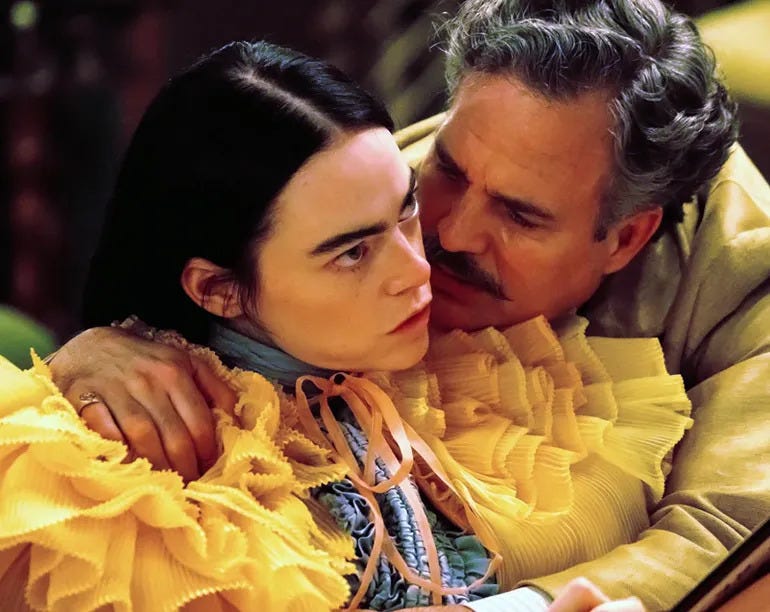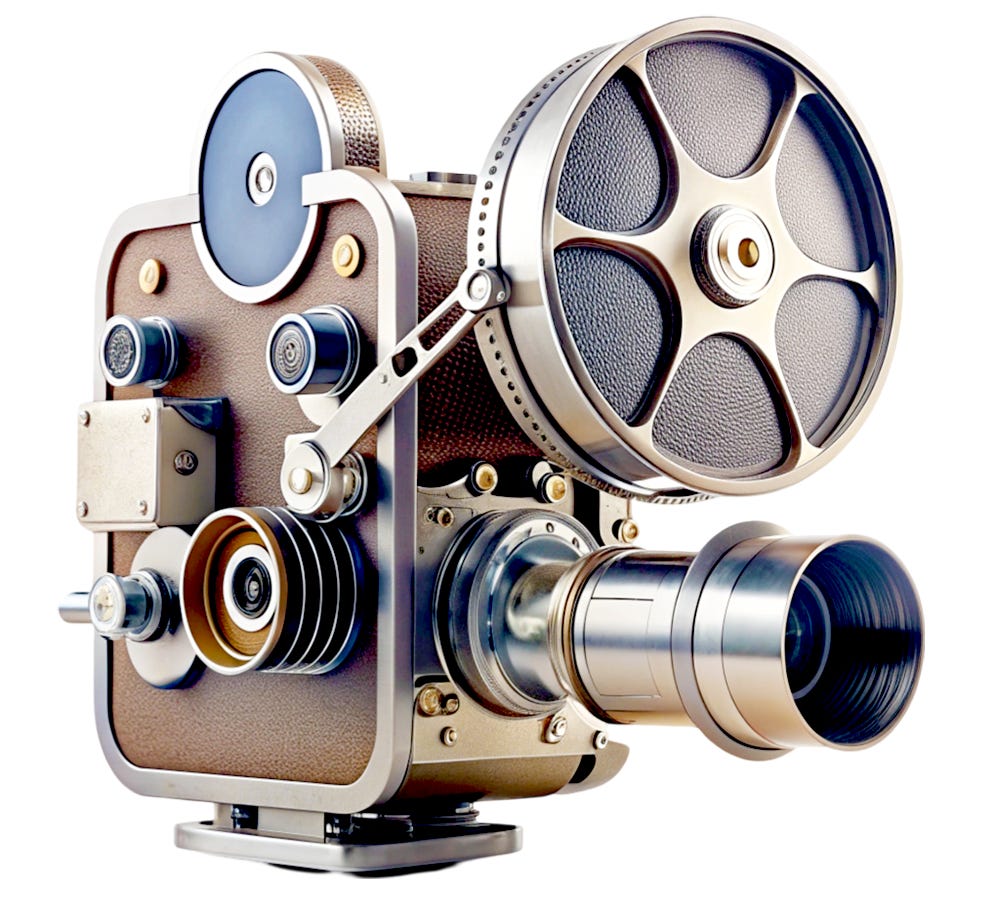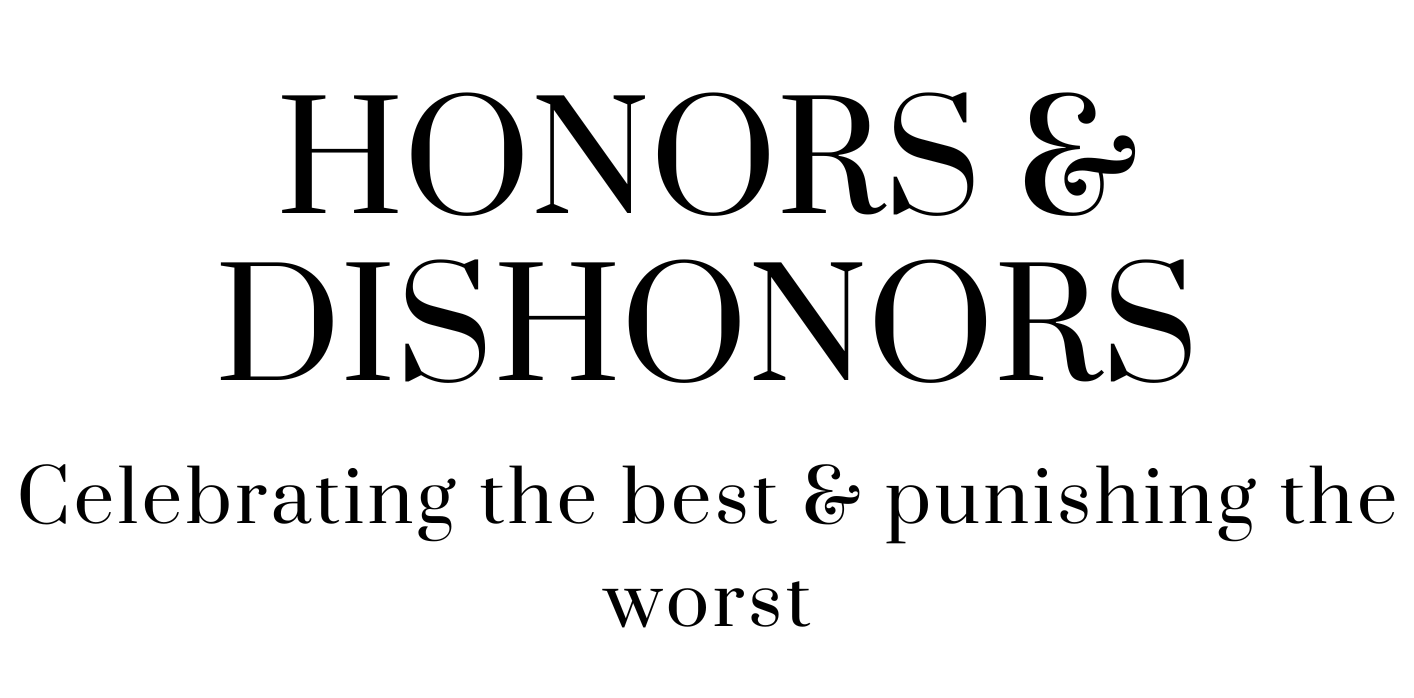
“Real submission begins with choice. Real freedom begins when you stop asking for permission.”
Poor Things
Poor Things is a masterpiece in its own right, a profoundly sexual film where the love languages of dominance and submission aren’t explained, but lived and breathed. For those attuned to power dynamics, its erotic undercurrent will be unmistakable.
This review was written by request, a fitting prompt for a film as singular and provocative as Poor Things. It’s one of those rare cinematic experiences that leaves you unsure of what you’ve just witnessed. Scoring it feels almost reductive; it’s less a film than a living work of erotic art.
Plot Summary
Brought back to life by a brilliant and eccentric scientist, Bella Baxter begins anew, with the mind of a child, in the body of a woman, and no memory of the world’s rules. What follows is a surreal, darkly humorous odyssey through pleasure, rebellion, and awakening, as Bella tears through the expectations placed on her with ravenous curiosity.
Poor Things is a feral resurrection: a woman reborn not into innocence, but into appetite. It’s a feminist Frankenstein stitched from absurdity, autonomy, and erotic power play, an exploration of what it means to unlearn obedience and choose desire on your own terms.
First Impressions
Poor Things is equal parts grotesque and gorgeous, a fever dream stitched from adult fairytale, erotic awakening, and power exchange. Emma Stone is luminous and fearless, anchoring a film that walks a razor’s edge between satire and sincerity. It’s deeply erotic, not just in its explicit sex scenes, but in its exploration of power, surrender, and the right to choose one’s own leash.
It’s a story soaked in D/s energy: the thrill of control, the rebellion of refusal, the heady rush of transgression. Bella’s world is built by men who seek to mould her, her adopted father, lover, doctor, master, but she slips each collar with wild grace, reclaiming agency with every act of defiance.
Surprising, sensual, and darkly hilarious, Poor Things announces its tone from the first frame. It’s an art film and absurdist comedy, visually dazzling and deliberately discomforting. Bella is magnetic from the start: submissive in posture, but never in spirit. Her evolution isn’t a slow burn; it’s a firestorm of curiosity, autonomy, and feral self-possession.
A surprising name, Poor Things. You expect fragility, tragedy, something broken. But what you get is something far stranger, and infinitely more powerful.
Themes & Power Dynamics
At its core, Poor Things explores ownership of body, mind, and choice. It’s a master/slave fantasy turned inside out, where the ‘slave’ is reborn free from shame and social programming. Bella’s journey is the inverse of a typical submissive’s: she begins obedient, unfiltered, and driven by curiosity, but learns to wield power by rejecting the roles imposed on her.
There are clear DDLG dynamics, layered with vulnerability and protection, but also moments that reflect the coldness of transactional control. The film holds a mirror to kink and domination, not through whips or collars, but through questions of consent, autonomy, and awakening.
This is a story about domination and surrender, but not as expected. Bella is passed between men who believe they hold authority: the scientist who “raises” her, the libertine lawyer who tries to seduce and shape her, the husband who expects ownership. But none succeed.
The D/s undertones are subtle yet profound: What happens when the submissive refuses to be shaped? When obedience is not consent, but part of awakening? Poor Things explores the difference between control and containment, and finds empowerment in the collapse of the latter.
Bella is not just a subversive heroine. She’s a mirror reflecting male projection and entitlement. Watching her learn, claim, and f**k her way into herself is both erotic and radically political.
Cinematic Style
Visually rich and wildly stylised, Poor Things drenches you in pastel dreamscapes that bend time and space like a surreal fever dream. Yorgos Lanthimos wields extreme wide lenses, theatrical sets, and wild camera angles to build a world that’s less “real life” and more emotional battleground, like a dollhouse where feelings run riot.
The surrealism isn’t just for show; it’s Bella’s fractured mind laid bare, and it nails the dizzying mix of awe and unreality many submissives might also feel when stepping into power exchange for the first time. From black and white to vivid colour, Bella’s oversized sleeves and flowing hair toy with scale, turning her into a living fairy tale, part porcelain doll, part fierce queen.
Costumes don’t just clothe Bella, they tell her story. Each outfit marks a step from delicate submission toward owning her power. And the soundtrack? Equal parts childlike whimsy and raw sensuality, it’s the pulse beneath the strange and stirring spectacle.
This isn’t just a movie. It’s a hypnotic plunge into the raw edges of desire and control.
Best & Worst Scenes
Best scenes:
Bella coolly dismantling Duncan, composed, savage, sublime.
Her floor-thrashing tantrums? Wetherspoons realness.
The prosthetic horse and carriage? Unhinged perfection.
And Crab-man. Just… Crab-man.
Worst Scene:
The returning husband. While it ties up some loose ends and explains a few “why?” moments, it feels like an unnecessary add-on. Still, it serves its purpose by highlighting Bella’s triumphant role reversal, seizing power from a tyrant.
Performance and Direction
Emma Stone is transcendent, every movement a masterclass in contrast, shifting from delicate baby deer to unapologetic sex goddess in a heartbeat. Fearless, raw, and utterly embodied, her performance is a total transformation that commands your attention.
Mark Ruffalo dives headfirst into his character’s absurdity, delivering one of the most unforgettable dominant male breakdowns in recent film history.
Lanthimos conducts this surreal symphony with grotesque tenderness, a wild cocktail of Lynch’s eerie mood, Burton’s gothic whimsy, and de Sade’s dark edge.
If there’s a weakness, it’s that the film’s surreal tone might alienate viewers craving straightforward storytelling. The sexual politics are intentionally messy, uncomfortable by design, and that’s exactly the point. It exposes the absurdity of shame, much like Bella’s childlike simplicity confronting the rigid protocols of adulthood.
The rawness of desire bleeds through the brothel scenes, and the film unapologetically flips the bird to high society and its hypocrisies. Watching it, I was reminded of the quiet power we all possess in youth, primal, natural, and untamed. By the time we recognise it, we’re often too old to reclaim it, even as billions are spent trying. Submission is much the same. Decades ago, I thought my desires made me broken. Now, I see the immense power they hold in their truth.
"I must travel the world and experience many men.”
~ Bella Baxter
“Does the whoring thing challenge the desire for ownership that men have?”
~ Bella Baxter
Pros and Cons
Pros:
Bold, original storytelling
Erotic without being exploitative
Visually stunning and surreal
A masterclass in feminist subversion
Stone's performance is iconic
Cons:
Surreal tone isn’t for everyone
Pacing occasionally uneven
Difficult to categorise (but that’s also a strength)
Reel Rating
⭐⭐⭐⭐⭐⭐⭐⭐ 8/10 Surreal & Submissive
Visually stunning, narratively daring, and emotionally unsettling. It walks the tightrope between grotesque absurdity and radical liberation.
Kink Rating
💋💋💋💋💋💋💋 7/10 Feral & Feminist
This isn’t Fifty Shades, but it’s not meant to be; it’s submission as rebirth, dominance as disintegration. Bella’s sexual awakening is messy, unapologetic, and full of agency. For those fluent in D/s, it’s not just kinky, it’s revolutionary.
Final Verdict
🍎🍎🍎🍎🍎🍎🍎🍎🍎🍎🍎🍎🍎🍎🍎 15/20 Bold & Bewitching
Poor Things is a surrealist kink odyssey wrapped in doll parts and stitched with wild want. Stone’s performance is a masterclass in embodied submission. unhinged, unashamed, and unforgettable.
A must-watch for viewers who crave power play with teeth, beauty with rot, and submission that doesn’t kneel, it conquers.
A Film For
Power exchange dynimcs and romantics
Feminist kinksters
Fans of dark erotic surrealism
A Film Not For
Traditionalists
Anyone uncomfortable with sexual agency
Those seeking realism over allegory
Blockbuster action
The Gilded Crop Award goes to: Emma Stone.
For wielding submission, surrender, and sex as powerful acts of rebellion.
The Broken Paddle Award goes to: Mark Ruffalo’s Duncan.
The most deliciously disastrous Dom (not that he’s really meant to be one) to ever grace the screen. All feathered cuffs and flustered thrusting, Duncan manages to dominate absolutely nothing, not even himself.
(To be clear: this is not a dig at Ruffalo. It’s brilliant comic acting, we just couldn’t resist.)
Winner: The Husband’s Overwrought Return
Yes, it tied the story together, but did it have to do it in such grandiose, gloomy fashion? A necessary thread, needlessly frayed.
Did You Know?
This isn’t your daddy’s Frankenstein. Poor Things is based on Alasdair Gray’s 1992 novel, a feminist, postmodern remix where the monster is a woman reclaiming her body, brain, and libido.
Emma Stone didn’t just play Bella, she birthed her. She produced the film and fought for every scene that let Bella be hungry, curious, and unapologetically sexual. She said the role “changed her completely.” You’ll understand why.
Director Yorgos Lanthimos is known for surreal, off-kilter worlds, but Poor Things is his most emotionally expressive to date. He called it “a film about liberation, pleasure, and becoming” words that wouldn’t be out of place in a submissive’s manifesto.
Willem Dafoe wore heavy prosthetics to transform into the grotesque-yet-gentle Godwin Baxter. The facial scarring echoes both Frankenstein’s creature and the emotional scars many characters carry beneath their eccentric exteriors.
Lanthimos originally cast Stone as Bella years ago, but the film was delayed due to COVID. When it finally happened, Stone said the role “changed her completely”, especially how she viewed power, shame, and freedom.
Related Films or Recommendations
Secretary (2002)
The Duke of Burgundy (2014)
Ex Machina (2015)
Titane (2021)
The Last Word
Bella begins as a submissive, but not to men, not to God, not to society.
She submits only to her own desire, her own becoming.
This isn’t a fall from grace.
It’s a rise to power, on her knees, and on her terms.
Fancy Another Watch?
If you’re curious for more kink-laced critiques or cinematic deep dives, head over to The Film Vault, your curated corner for the dark, the daring, and the downright delicious.
Drop a comment below and cast your vote! Want more deep dives into cinema’s sensual and subversive side? Stick around, there’s plenty more to come.






















That was quite a thorough dissection. My interests are piqued...primarily because of crab-man. Well done, Miss O.